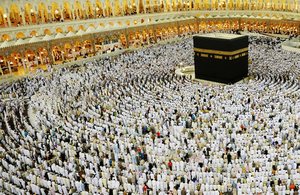Latest travel health advice for Hajj and Umrah pilgrims published
PHE and NaTHNaC outline health and travel advice for Hajj and Umrah pilgrims.

Public Health England (PHE) and the National Travel Health Network and Centre (NaTHNaC) have published updated health information and travel advice for those travelling for the Hajj and Umrah. All pilgrims are advised to familiarise themselves with this advice, which is available on the NaTHNaC website.
In line with the World Health Organization (WHO), PHE and NaTHNaC do not currently advise any travel restrictions to the Kingdom of Saudi Arabia (KSA) in relation to the outbreak of Middle East respiratory syndrome coronavirus (MERS-CoV), and overall the risk of UK residents travelling to the Middle East contracting the virus remains very low. However, 1,377 cases have been reported from KSA from 2012 until 9 June 2016, occurring mainly among KSA residents.
Dr Dipti Patel, director of NaTHNaC, said:
If you are planning to undertake Hajj or Umrah this year, you should visit your GP at least 4 to 6 weeks before your trip to check whether you need any vaccinations or other preventive measures.
Our information sheet for pilgrims includes information on health regulations, vaccine requirements and recommendations, and other general health advice for those planning to travel for the Hajj and Umrah. Pilgrims are strongly advised to follow our specific guidance about staying safe and healthy when travelling.
Dr Gavin Dabrera, lead for MERS-CoV at PHE said:
MERS-CoV can cause a serious and sometimes deadly illness. There is no vaccine or specific treatment for MERS-CoV. However, by adopting certain precautions, you can protect yourself and others.
There is strong evidence the dromedary camel is an important host species for transmitting MERS-CoV to humans. We strongly advise travellers to not drink camel milk or eat camel meat and to avoid contact with camels in the Middle East. It is also very important to practise good hand and respiratory hygiene to reduce the risk of respiratory illnesses.
Pilgrims returning from Hajj and Umrah with flu-like symptoms including fever and cough, or shortness of breath within 14 days of leaving the Middle East, should contact their GP immediately by phone and mention their travel history.
Umrah is a shorter, non-compulsory pilgrimage for Muslims that can be performed at any time. Hajj is the annual pilgrimage to Makkah (Mecca) in the KSA.
General travel health advice for travellers going to Saudi Arabia is available from NaTHNaC’s TravelHealthPro website. See also PHE’s information on MERS-CoV.
Read useful information and advice about healthcare abroad on the NHS Choices website.